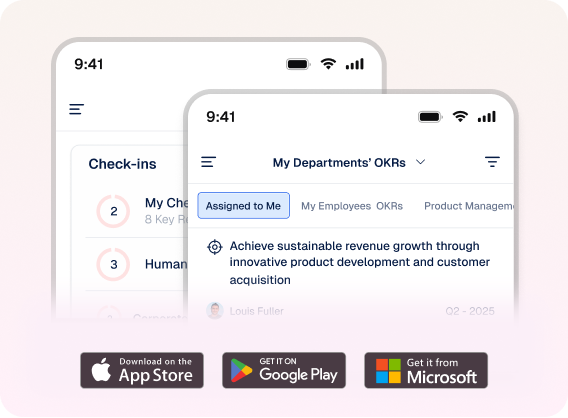Your objectives in Profit can be organized using a system of tags or labels. Tags can either describe your OKRs using words like “Aspirational” or “Committed”, or you can categorize them based on department with words like “Sales” and “Finance.” Tags can be created in settings by a superuser. Contact a superuser if you’d like… Read more
Check-Ins Key result check-ins are an opportunity for you to track your KR completion and indicate your confidence level in achieving your key results. How often you check-in on a key result is dependent on the frequency you set for your key results during the creation process. Many organizations select a frequency of once a… Read more
Task Management How do I create a recurring task? What is the best way to manage high priority tasks for myself and my organization? How do I manage and stay on top of tasks that I’ve assigned to others? Tasks can be added to key results to break them down into manageable assignments and projects…. Read more
OKR Execution You may have created an OKR that you were able to complete before your target date. If you’ve completed most or all of your key results, you can always add more to continue to achieve your objective. To learn how to add a key result, see the “How do I create key results”… Read more
Awards and Leaderboard How do I award my peers? How do I view awards given by my team members? How do I view awards given by me? How do I view awards that I’ve received? Profit’s awards system allows you to view both the awards that you have received and the awards that others in… Read more
OKR Score Profit has a customizable scoring system for all users that evaluates their performance in four areas: reporting promptness, individual achievement, team achievement, and alignments. To view your Profit score, navigate to your “All my OKRs” page. Your score is represented in a bar at the top of the page. Superusers can customize the… Read more
Hashtagged Conversations In Profit, you can use hashtags to organize your conversations with key words. Any time you or another person in your organization uses a hashtag to describe their OKR experience in a check-in, an OKR review, or a reflect/reset, you will see it on the “Hashtagged Conversations” page. Your company can create and… Read more
Watching OKRs One way to stay on top of specific OKRs is to use the “Watch” function in Profit. You can watch any OKR that is of interest to you. To watch an OKR, select the “OKR” tab on the left side of the page. Once on this page, consider which OKR you’d like to… Read more
OKR Reviews OKR reviews are an additional way to check-in on your OKR progress. In Profit, you have the option to create general OKR reviews or you can create a review for a specific OKR. OKR Reviews may need to be enabled by a superuser. Profit’s software automatically uses PPP (Progress, Plan, and Problems) methodology… Read more
Conversations and News Feed To indicate that you’ve learned something new, you can use hashtags in your check-in comments, OKR reviews, and reflections/resets. A superuser can add and create hashtags to be used in the program. They can also disable the use of any inappropriate or unnecessary hashtags that have been created. Below are examples… Read more
Reflect/Resets To enable reflect/resets, navigate from Settings → OKRs → Reflect/Reset. Here you’ll find a list of template questions that can be enabled or disabled depending on the reason for the Reflect/Reset. You also have the option to create custom questions by selecting the “Create” button. How do I reflect on an objective? The first… Read more
Profit.co allows users to perform Self-assessment in performance evaluations. This provides an opportunity for all employees to showcase their achievements, strengths, weaknesses, and strategies for the future. Why this feature? Initiators can start employee performance reviews, and the users can perform their Self-Assessment. Self-Assessment is the first step of the review process. This will enable… Read more





